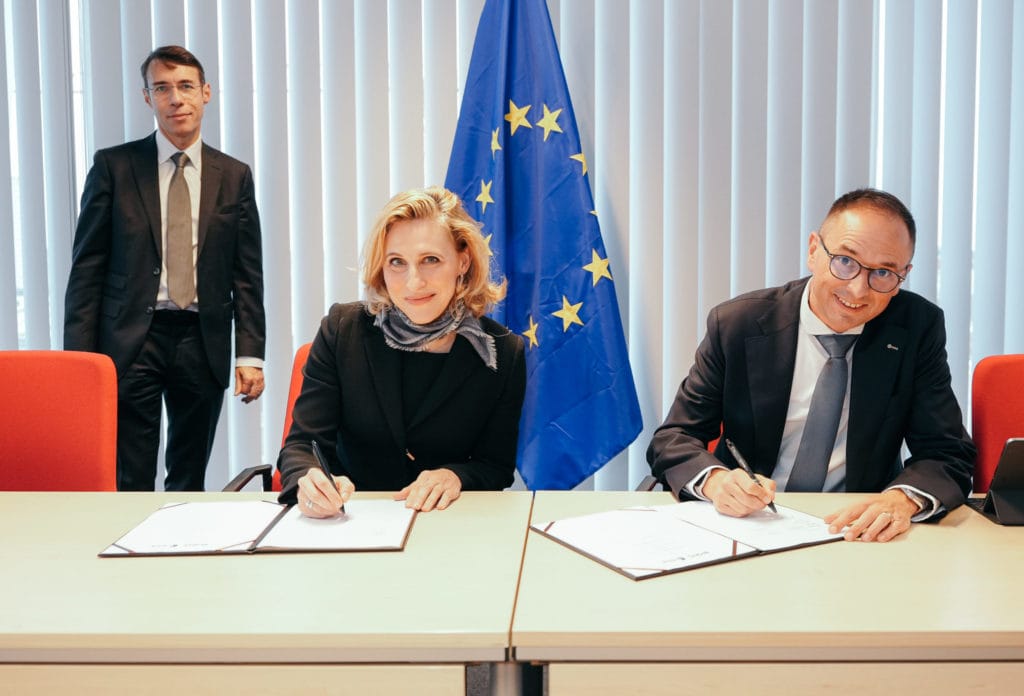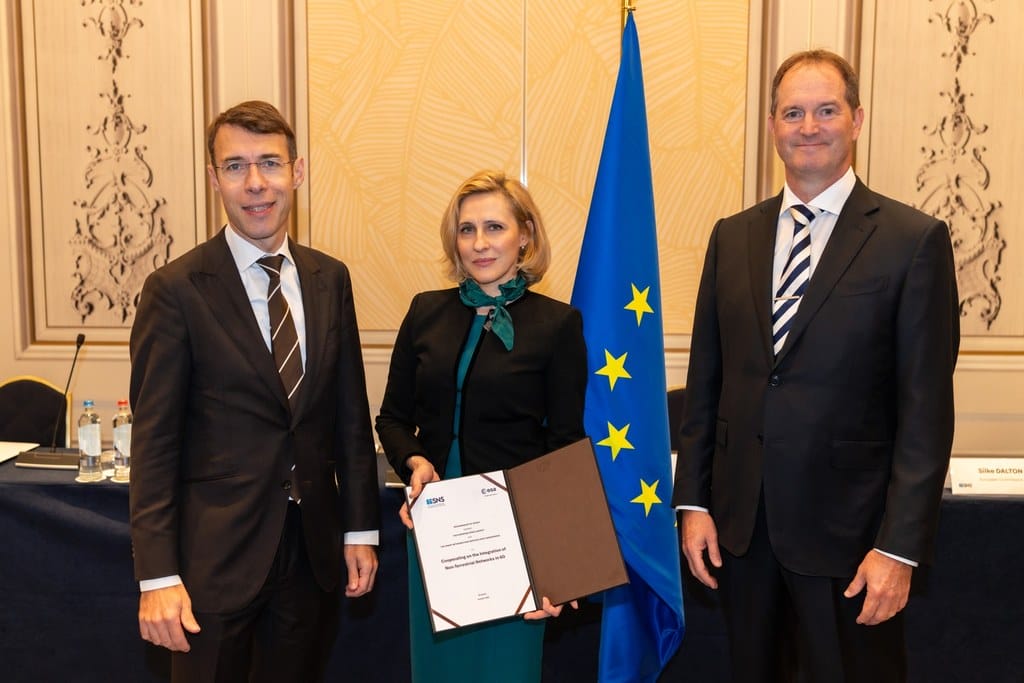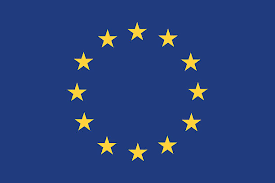SNS JU and ESA Join Forces to Accelerate the Integration of satellite networks in 6G

Today, 16 October 2025, the Smart Networks and Services Joint Undertaking (SNS JU) and the European Space Agency (ESA) officially signed a Memorandum establishing a collaboration to accelerate the innovation in the integration of terrestrial and non-terrestrial networks for 6G, ensuring smarter connectivity and services for European industries and citizens.
Brussels/Paris, 16 October 2025
Today, the Smart Networks and Services Joint Undertaking (SNS JU) and the European Space Agency (ESA) officially signed a Memorandum of Intent (MoI) in Brussels, marking a significant milestone in European cooperation on next-generation connectivity. This strategic partnership – between the Space for 5G/6G & Sustainable Connectivity programme within ESA’s Connectivity and Secure Communications – aims to bring the mobile and satellite network players together to enhance research and development and accelerate the innovation in the integration of terrestrial and non-terrestrial networks to provide ubiquitous, seamless, resilient and high-quality connectivity tailored to industry sectors and citizens across Europe.
Bridging Space and Ground Networks for Ubiquitous Connectivity
By combining SNS JU’s expertise in advanced network technologies with ESA’s world-class space infrastructure, the partnership will focus on several activities:
- Large-Scale trials of 6G Terrestrial/Non-Terrestrial Network connectivity for industries and sectors such as mobility, utilities, agriculture, media, as well as mobile broadband services for citizens throughout Europe. These trials will generate valuable data, performance benchmarks, and insights to improve interoperability of TN/NTN solutions. It will ensure collaborations with industry and standardisation bodies to ensure the outcomes of these trials inform global standards for integrated connectivity.
- Access to Advanced Testing Facilities – There will be future opportunities for SNS JU’s 6G projects to gain access to ESA’s state-of-the-art ground and in-orbit laboratories, including the ESA 5G/6G Hub and Telecom Lab, as well as future in-orbit demonstration satellites. These facilities will enable interoperability testing, 5G/6G use cases development, and real-world validation of innovative TN/NTN solutions.
- Seamless flow of knowledge, technical expertise and best practices, as well as Joint Innovation in Next-Generation Applications – The collaboration will explore groundbreaking 6G use cases in connected mobility, edge computing, and enhanced network resilience, maximising the potential of integrated terrestrial and satellite networks for industry and citizens.
This partnership underscores both organisations’ dedication to bolstering Europe’s technological resilience and competitiveness in the emerging 6G arena. By uniting the mobile and satellite network communities, SNS JU and ESA aim to accelerate innovation and ensure Europe remains a robust, leading force in shaping the future of ubiquitous connectivity.
A Step into the Future
The collaboration will facilitate knowledge exchange, resource pooling, and the development of open industry standards, contributing to the deployment of robust next-generation communication technologies that will underpin Europe’s sovereignty and digital future.
“6G connectivity will be both terrestrial and through space. Congratulations to the SNS JU and to ESA for signing the Memorandum. It will help secure European technological leadership at the forefront of 6G development and help our telecom and space communities to work and experiment together and build new services that will benefit our industries and our citizens” – said Thibaut Kleiner, Director for Future Networks, DG CONNECT.
Laurent Jaffart, Director of ESA’s Connectivity and Secure Communications said: “Our ambition at ESA is to ensure that everyone is connected, everywhere, and at all times; the fusion between networks in space and on the ground is a key ingredient to truly serve the connectivity needs of our Member States. By joining forces with key partners such as SNS JU, we are continuing to strengthen Europe’s autonomy and resilience, whilst boosting the continent’s competitiveness and growth. I look forward to the opportunity of pooling our expertise and resources, as we work together to elevate Europe on the global stage – and into the future of 6G.”
“The collaboration between ESA and the SNS JU to accelerate truly ubiquitous 6G – integrating space and terrestrial networks – is an important step towards our mission to facilitate European technology sovereignty in 6G. This Memorandum paves the way for new opportunities for SNS JU’s 6G projects to access ESA’s cutting-edge ground and in-orbit laboratories to conduct extensive testing and trials with 6G terrestrial and non-terrestrial networks. I am particularly excited that this initiative will engage SMEs, researchers involved in our projects, and key industrial sectors – supporting innovation and competitiveness. I look forward to the transformative impact that this partnership will have on our collective journey into the future of connectivity – said Erzsébet Fitori, Executive Director, SNS JU.”
About SNS JU
The Smart Networks and Services Joint Undertaking (SNS JU) is a European public-private partnership driving research and innovation in advanced network technologies, including 6G. SNS JU supports Europe’s leadership in developing secure, sustainable, and competitive connectivity solutions. HOME – SNS JU
About the European Space Agency
The European Space Agency (ESA) provides Europe’s gateway to space. ESA is an intergovernmental organisation, created in 1975, with the mission to shape the development of Europe’s space capability and ensure that investment in space delivers benefits to the citizens of Europe and the world.
ESA has 23 Member States: Austria, Belgium, the Czech Republic, Denmark, Estonia, Finland, France, Germany, Greece, Hungary, Ireland, Italy, Luxembourg, the Netherlands, Norway, Poland, Portugal, Romania, Slovenia, Spain, Sweden, Switzerland and the United Kingdom. Latvia, Lithuania and Slovakia are Associate Members. ESA has established formal cooperation with four Member States of the EU. Canada takes part in some ESA programmes under a Cooperation Agreement.
By coordinating the financial and intellectual resources of its members, ESA can undertake programmes and activities far beyond the scope of any single European country. It is working in particular with the EU on implementing the Galileo and Copernicus programmes as well as with Eumetsat for the development of meteorological missions. Learn more about ESA at www.esa.int
Media Contact
SNSJU
Chiara Mazzone
chiara.mazzone@ext.ec.europa.eu
ESA
ESA Media Relations Office
media@esa.int






